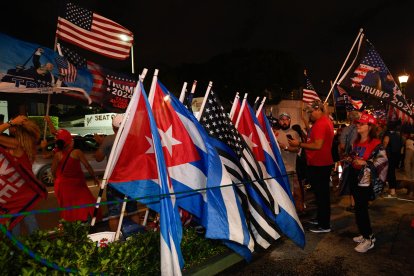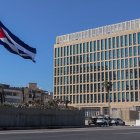Cuban exiles lose their privileges in the US following Trump's latest measures
According to the Center for Engagement and Advocacy in the Americas, more than 500,000 Cubans are at risk of deportation.

Cubans in Florida support Trump's candidacy.
Cuban immigration has enjoyed exceptional privileges in the United States for decades, regardless of who was in power. However, the Donald Trump administration is now ending those benefits.
Sixty-six years after Fidel Castro's dictatorship was established, the island's ongoing economic crisis and the repression of dissent have led to approximately 1,757,300 Cubans currently residing in the U.S., according to data from the United Nations Organization (UN), published in 2021.
Since 1960, natives of the Caribbean island have fled to the U.S. in various waves of migration, prompting the White House to implement measures to regulate this exodus.
Cuban exile privileges in the "land of the free"
In addition to migration resources that facilitate their stay and regularize their status, Cubans have benefited from other social programs, making their "new life" in the U.S. more promising.
The Cuban Adjustment Act (CAA), signed in 1966, allows Cubans who have been in the U.S. for one year to obtain permanent residency, a process much faster than for most other nationalities. Cubans are also exempt from quotas and other requirements, such as proving family ties or employment reasons for residency.
The "wet foot, dry foot" policy, established under the previous administration and repealed by Barack Obama in 2017, granted asylum to countless Cuban immigrants who arrived illegally by sea. Once they touched U.S. soil, they were entitled to protection.
Cubans are also exempt from the immigration quotas that apply to other nationalities. They were included in the CHNV (Humanitarian Parole) program, which has been halted but, for over a year, facilitated the regular entry of hundreds of thousands of Cuban families to the U.S.
Additionally, Cubans may be eligible for ORR benefits, including cash assistance, medical services, employment readiness programs, and other services provided by the Office of Refugee Resettlement.
They received millions of dollars in federal benefits, including SSI, TANF, Medicaid, and SNAP. In addition, they benefited from family reunification, allowing immediate family members of Cubans in the U.S. to apply for visas.

World
Trump Administration reinstates and expands Cuba Restricted List, adding remittance company tied to Castro regime
Emmanuel Alejandro Rondón
The legal path for Cuban immigrants
Many Cubans who arrived under previous programs remain safe. However, more than 110,000 entered through a temporary humanitarian parole initiative. Hundreds of thousands of other Cubans are in the U.S. under "release and bond" documentation, which, until recently, guaranteed their safety as long as they reported regularly to immigration.
Both programs are now under scrutiny by the Trump administration. "Never in recent history have so many Cubans in the United States been at risk of detention and deportation," warned the Center for Engagement and Advocacy in the Americas in a recent newsletter.
The group estimates that more than 500,000 Cubans are at risk of deportation.
Last week, Federal Court Judge Indira Talwani ruled to temporarily block the government's attempt to shut down the parole program and raised concerns about whether it was targeting the justice system for political reasons.
Politicians ask Trump to look out for Cubans
Rep. Maria Elvira Salazar, a Florida Republican and staunch Trump supporter, has increasingly spoken out about the need to protect Cubans from deportation.
Cubans and others "came here fleeing failed communist countries, believing Biden's empty promises. The Trump administration should take this into account and not punish them for Biden's mistakes," Salazar said in a post on X. "Let's give them the opportunity to apply for the protections they were promised," the Cuban-born congresswoman added.
">Los cubanos con I-220A saben quién ha estado ahí desde el primer día.
— María Elvira Salazar 🇺🇸 (@MaElviraSalazar) April 14, 2025
Huyeron del socialismo y no se dejan engañar por los ataques baratos de la izquierda.
Gracias por alzar su voz y defender la verdad. ¡Estoy con ustedes, siempre! 🇨🇺💪🇺🇸#mariaelvirasalazar #i220a pic.twitter.com/6HmUR2otk7
Florida Republican Carlos Gimenez submitted a list to the Department of Homeland Security last month, naming 100 individuals he claimed were members of the Cuban regime who had infiltrated the United States during the Biden administration.
While calling for their expedited deportation, he also emphasized that the United States should remain "a beacon of hope and freedom for those escaping tyranny."
Gimenez, who also has Cuban roots, recently delivered a letter to Trump calling for the elimination of flights and remittances to the island in an apparent effort to suffocate the dictatorship, as he stated.
The reality is that hundreds of thousands of Cubans are at risk of deportation as Trump seeks to eliminate protections granted by previous administrations. While some aspects of the new measures have been temporarily blocked in the courts, new arrivals fear their path to legal immigration may no longer be possible.
RECOMMENDATION
























